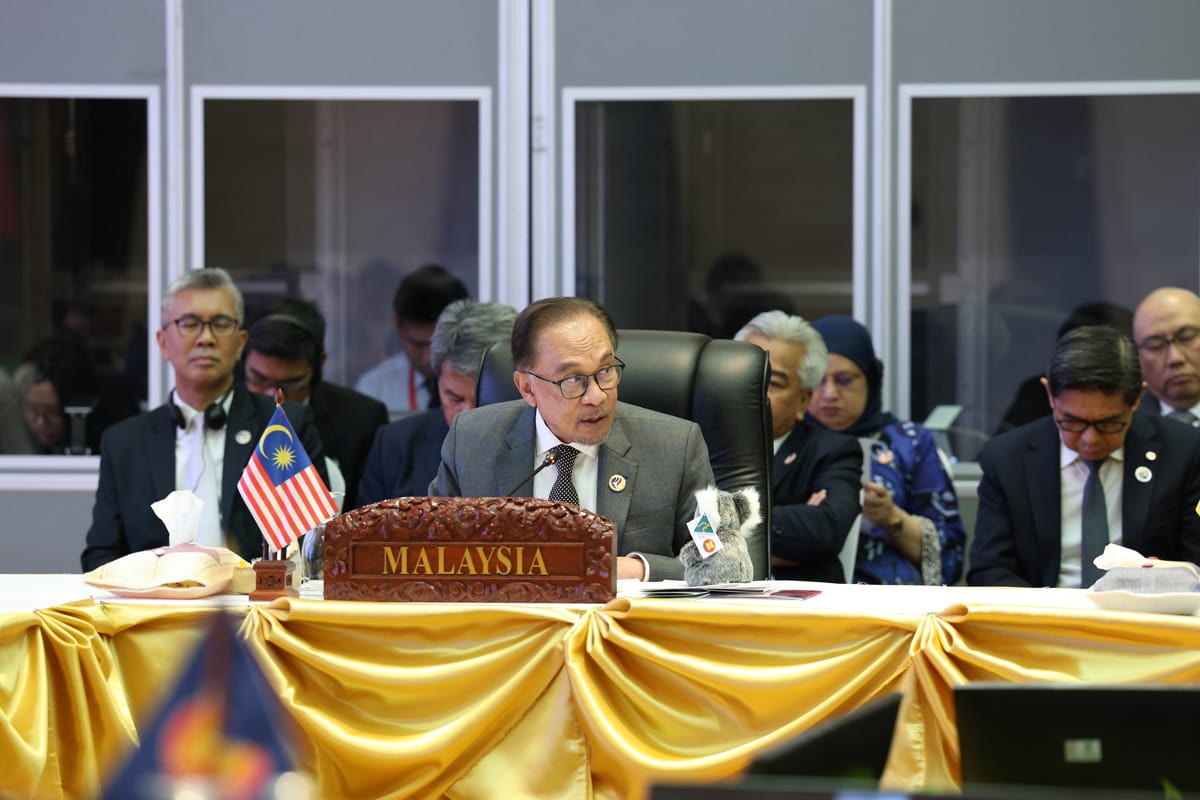In recent years, expectations for the Association of Southeast Asian Nations to “get its act together” and actively respond to regional challenges have been met with disappointment. Lukewarm responses, such as the largely inconsequential Five-Point Consensus on the Myanmar crisis, have demonstrated how difficult it can be for the grouping with its consensus model of decision making to reach beyond superficial actions. This has prompted proposals to exercise an “ASEAN Minus X” formula, sparking further debate on the bloc’s principle of equality.
But there are fresh expectations for Malaysia to “liberate” ASEAN from its ongoing existential crisis when it assumes the chair of the grouping for 2025. These expectations largely stem from need – new leadership always brings fresh hope – as well as a newfound confidence in Malaysia to act since Prime Minister Anwar Ibrahim took office in 2022.
It’s true that similar expectations accompanied Indonesia’s turn as chair last year, and while significant strides were made in that time, such as the launch of the ASEAN Indo-Pacific Forum and the Digital Economic Framework Agreement, Jakarta’s efforts did not deliver on the sky-high expectations.
Malaysia faces a similar context. Anwar has proved vocal on matters of international importance, which raised expectations about Malaysia’s convening power to address issues that are increasingly debilitating ASEAN, and swiftly, at that.
Where consensus is concerned, issues likely at the top of Malaysia’s agenda will be Myanmar and the South China Sea, on which Anwar has been outspoken.

ASEAN’s failure to address the political and humanitarian crisis in Myanmar has brought into question its legitimacy as a regional player. It also challenges the principles that the regional bloc is built upon. After taking office, Anwar suggested that it would be practical to “carve Myanmar out for now”, meaning that ASEAN should focus on strengthening its internal mechanisms before tackling the crisis. Malaysia continues to believe that a tougher stance is needed towards Myanmar’s junta, urging it to comply with the Five-Point Consensus, and has indicated a willingness to play a mediator role and negotiate with the various stakeholders in Myanmar to end the civil war.
The South China Sea is another difficult flashpoint. As a claimant state in the territorial dispute, Malaysia as chair will be expected to make progress in securing stability in the contested waters. At the ASEAN-China Summit last week, Anwar called for an conclusion to a Code of Conduct agreement, despite its slow-moving negotiations stretching all the way back to 2002. As Malaysia is also incidentally the ASEAN country coordinator for China, there have been questions about how Putrajaya will wield its influence to bring Beijing to the table.
Whatever approach Malaysia takes, dealing with challenges boils down to the broader issue of ASEAN’s ability to move beyond a shallow consensus. It seems unlikely that Malaysia can achieve much on this front, especially considering the recent changes in leadership across Southeast Asia and the uncertainties that can be expected in their early terms.
There is too much emphasis placed on the rotating chair.
Today, we are dealing with a new, though not necessarily refreshed, ASEAN. Singapore’s Lawrence Wong and Thailand’s Paetongtarn Shinawatra have just come into office in recent months. Anwar, Philippines’ Ferdinand Marcos Jr and Laos’ Sonexay Siphandone have been in their jobs since 2022. Cambodia saw a historic leadership change in 2023 with Hun Manet taking over, while Indonesia will also welcome a new president this month as Prabowo Subianto takes office. Arguably, even Myanmar has seen change following the coup d’état in 2021. Virtually all ASEAN states have been affected, save Brunei given its absolute monarchy.
ASEAN is criticised for being divided, but the leadership changes indicate that priorities are shifting heavily towards domestic issues. After any transition of power, shoring up a base of support at home always take precedence in the initial years to ensure political stability. Given the scale of changes happening in the region, it will undoubtedly take time for intra-ASEAN dynamics to unfold. And this makes expectations of strengthened consensus premature.
The hope should be instead for Malaysia to “reinvigorate the ASEAN spirit” and set the momentum for subsequent chairs. The onus shouldn’t be on Malaysia alone. Moving past the deadlock is a common goal and relies on all member states to pull their weight. Expectations should be levelled on members such as Indonesia or Singapore, which carry the political currency to play a more enhanced role in ASEAN, regardless of the country that sits in the chair.
There is too much emphasis placed on the rotating chair. These expectations must be tempered by the limitations of what can be realistically achieved in a single year. Instead of fixating on consensus, Malaysia’s real contribution could be in laying the groundwork for a more cohesive, forward-looking ASEAN with effective and resilient mechanisms to better navigate the turbulent years ahead.

